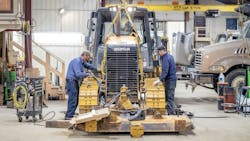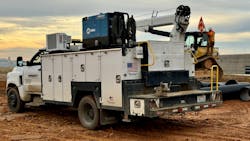Sargent Uses Machine Data for Regional Fleet Maintenance
Ryan Kennedy leads a team of seven technicians responsible for field maintenance across three states for Sargent, based in Orono, Maine. Kennedy’s team is spread across Maine, New Hampshire, and Massachusetts.
Kennedy, field maintenance foreman for Northern New England, is a member of the Under 40 in Construction Equipment Class of 2024.
“I try to go out once a week to check in with the crew, see how everything’s going, and make sure any issues are handled quickly,” Kennedy says. With the responsibility of managing hundreds of pieces of equipment across multiple states, Kennedy’s role is crucial for minimizing downtime and maximizing efficiency.
“One of the team’s key strategies for ensuring equipment reliability is its use of telematics. Sargent uses HCSS Equipment360, which is integrated into most of the equipment and provides real-time data on machine performance, fault codes, and service intervals.
“We’ve been using telematics since 2007, and it’s really starting to show its value in how we maintain our fleet”,” says Tim Richards, equipment manager. Machine data allows the maintenance team to be proactive rather than reactive, helping to prevent major repairs before they become an issue.
The latest on equipment maintenance
- Western Global's upped-capacity DEFCube diesel exhaust fluid tank
- Key maintenance considerations when running renewables
- How to maintain DEF quality
- Maintenance management tips from Tim Giggee, CEM Blattner Company
Brandon Mace, assistant equipment manager, who is shadowing Richards in preparation for eventually taking on the role of equipment manager, recognizes the growing importance of these technological tools.
“We’ve really embraced telematics and software systems to help us be more efficient,” he says. “Ryan and I are working on fine-tuning the way we use our software to streamline our processes, and it’s already making a difference.”
Part of the success in managing such a large fleet is the company’s dedication to scheduled maintenance. Instead of waiting for winter to bring all equipment in for servicing, which is still the norm throughout the Northeast, the team now schedules annual maintenance throughout the year. “We used to do winter maintenance from December to March, but now we bring equipment in during June or July if needed,” Richards says. This practice ensures that the shop doesn’t become overwhelmed, improving the team’s ability to manage resources efficiently without compromising service quality.
Another aspect of Sargent’s maintenance strategy is the use of a dedicated lube truck. One of Kennedy’s team is responsible for traveling across the region to change oil and perform scheduled maintenance on equipment in the field. “Having a lube tech on the road really helps us stay on top of regular service intervals,” Kennedy says. “It reduces the risk of component failures and ensures that machines stay in top condition.”
He used machine data to manage these services. “I use the system to track service intervals and get alerts when equipment is due for maintenance,” Kennedy says. “Every Monday, I print a list of machines that need servicing based on their hour readings and location. Then, I group them together and create a schedule for our lube tech, trying to minimize downtime while covering the most machines in the shortest time.”
Sargent’s maintenance practices are not without their challenges, however. One of the biggest hurdles is balancing tight deadlines with maintenance needs.
“A lot of it comes down to timing,” says Kennedy. “Sometimes equipment is pushed to the limit to meet deadlines, and that can complicate things.” Mace echoes this sentiment: “Communication is always a challenge in any company, but when you’re dealing with so many moving parts and people, it’s even more important.”
Richards credits Kennedy with handling these complexities well. “Ryan understands what can and can’t be done in the field,” he says. He’s good at making quick decisions and adapting to whatever the situation demands.”
As Sargent continues to grow, maintaining equipment reliability and minimizing downtime will remain a priority, according to Kennedy. With strategies like a dedicated lube truck and a consistently updated maintenance schedule, the company is set to handle the demands of a growing fleet while keeping its machines running efficiently across New England.
About the Author
Harlee Hewitt
Harlee is a former associate editor for Construction Equipment.


